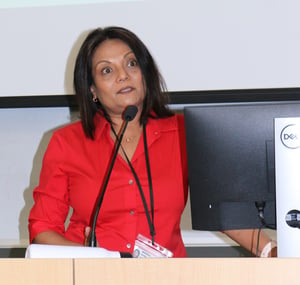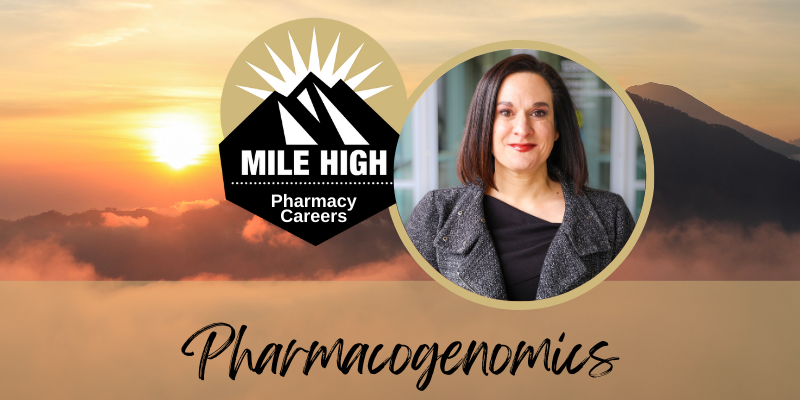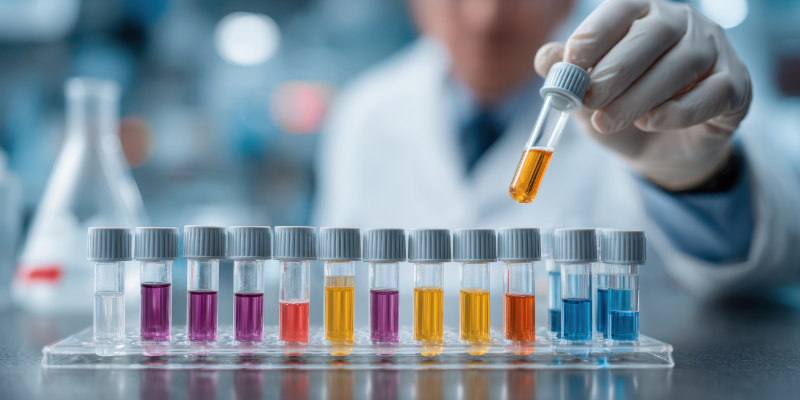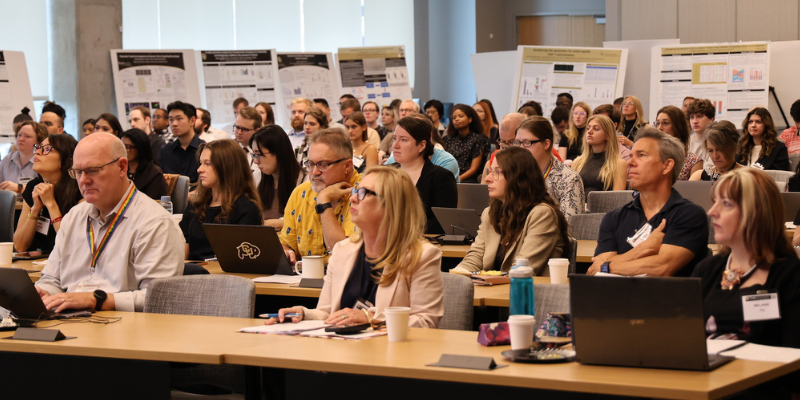It felt like a virtual who’s who of pharmacy rockstars at the recent Research Roundtable hosted by the Honors Program at CU Skaggs School of Pharmacy and Pharmaceutical Sciences (SSPPS). From a second-year PharmD student who described her current foray into the research field, to a seasoned faculty researcher who once rounded with Dr. Fauci at the National Institutes of Health (NIH), the passion for research, at all stages, was on full display.
The sentiment of the event was perhaps best captured by P2 Anna Figueroa: “The question is not should I do research, but what kind of research should I do?”
According to research faculty, many students assume that the field of research is only available to PhDs or those with deep wet lab experience. However, they stressed that PharmD students can make unique contributions to the field. Many speakers, including recent PharmD grad and current PhD student Madison Ricco, addressed the unique perspective that Doctor of Pharmacy students bring to research.
“As PharmDs we’re trained to be focused on the patient. How can we optimize medication and clinical care?” Ricco said. “I was able to bring this perspective to my drug delivery research project as a PharmD student working in Dr. Tom Anchordoquy’s lab.”
.jpg?width=300&height=340&name=Ricco.4%20(2).jpg)
PharmD grad and PhD student Madison Ricco works in Dr. Tom Anchordoquy's lab. |
As a first-year pharmacy student, Ricco blazed the trail for other PharmD students to actively pursue high-level research while completing their PharmD degree. Her ongoing research explores the possibility of someday using cow’s milk as a delivery agent for chemotherapy. (Che-MOO-therapy as it has been called.) If she and her mentor, Dr. Anchordoquy, can crack the code on using milk exosomes for this purpose, the impact on patient care could be life-changing.
“The cancer patient wouldn’t have to drive to the hospital for an IV infusion of chemotherapy anymore,” Ricco said. “Someday, there could be an oral option for drinking chemotherapy carried by these milk exosomes that can cross the gut and into their bloodstream.”
In the meantime, Ricco’s work involves the unglamorous, but necessary, work of traveling to Ft. Collins, Colorado for their plentiful supply of cow’s milk from which she extracts the exosomes for her drug delivery research.
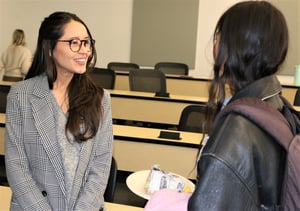
P2 Anna Figueroa discusses her research with another pharmacy student. |
PharmD student, Anna Figueroa, echoed Ricco’s enthusiasm for research.
“Before starting pharmacy school, I searched the (SSPPS) website looking for faculty who were exploring research questions that really spoke to me,” Figueroa said. “When I found Dr. Manisha Patel’s work, I knew it was something that I could really believe in and give myself to.”
Today, as a second-year pharmacy student and recipient of the AFPE Gateway to Research Fellowship, Figueroa is working in Dr. Patel’s lab researching the role of oxidative stress and metabolic dysfunction in epilepsy and its comorbidities. Figueroa encouraged other students to not be scared off if they don’t have previous wet lab or clinical research experience, to not be afraid to ask questions, and to find a faculty mentor with whom they want to be in the “trenches”.
|
Dr. Manisha Patel encourages students to consider all the ways they can be involved in research. |
Based on the mutual admiration displayed, such faculty mentors are not in short supply in the School of Pharmacy. Dr. Manisha Patel, associate dean of research at the School, and a nationally renowned expert in neuroscience epilepsy research described the fascinating research opportunities available to PharmD students.
“You can explore the effects of drugs on the body, dosing, and testing. You can develop novel therapies, design trials, discover new drugs, or determine how a drug can be made available to certain populations.” Patel said. “Research will take you to the depth and breadth of what the science is all about. You’re always on the brink of new knowledge. It’s scary and exciting.”
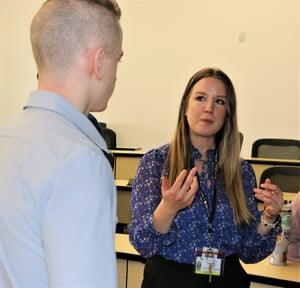
Dr. Kristina Brooks gives research advice to a PharmD student. |
Assistant professor and faculty researcher Dr. Kristina Brooks, PharmD, started with a Bachelor of Science in neuroscience. She explained that her research began with zebrafish, but she really wanted to interact with people and directly impact patient care with her research. Starting as a P1, she worked with a mentor on a rare pediatric lung disease and after completing her PharmD, ended up doing a two-year fellowship with the NIH Clinical Center in clinical pharmacology.
“I did clinical research in pediatric rare diseases and HIV. We studied the pharmacokinetics of drugs being used off-label in children and worked closely with the HIV clinic,” Brooks recalled. “My full nerd-out moment was when I rounded on patients with Dr. Fauci!”
Dr. Brooks credits her PharmD degree with setting her up to work well with a variety of professionals. She now works on antiviral pharmacology with colleagues Peter Anderson, PharmD and Jennifer Kiser, PharmD, PhD. During the pandemic, she worked with the IMPAACT network and Gilead Sciences, Inc. to study remdesivir, a COVID medication, in pregnant people. Her primary research is focused on antiviral pharmacology in pediatric and pregnant populations. Brooks is currently studying a fixed-dose combination tablet containing antiretroviral medications that can dissolve in water for children with HIV with the IMPAACT Network.
“The difference between research and clinical practice is that with research – with developing a new drug, for instance, you can impact not just one patient, but an entire population,” Brooks said.
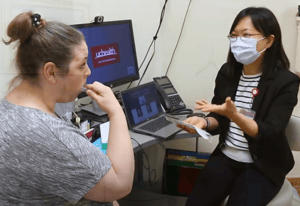
Dr. Yee Ming Lee explains how to take a DNA sample to a personalized medicine patient. |
Assistant professor, Dr. Yee Ming Lee, PharmD, is the current chair of the PharmD Honors Research Program and the roundtable event. Dr. Lee’s area of specialization is pharmacogenomics, often referred to as precision medicine. Her work involves using a patient’s genetic information to determine which drug and dose to prescribe for a patient in clinical practice.
Dr. Lee encouraged pharmacy students to start exploring research options early in pharmacy school. Even students in the remote and online PharmD programs can participate in research projects such as those involving data analytics, clinical chart reviews, and pharmaceutical outcomes.
As the roundtable session ended, the energy in the room continued to rise. Judging by the number of students waiting in line to talk further with the presenters, Dr. Patel’s message was heard loud and clear:
“There are endless career paths in research,” she said. “NIH has a loan repayment program if you’re involved in clinical research. You’ll get to be the expert in a field. It looks great on a resume. And it’s fun! Why wouldn’t you be interested in research?”
.png)
